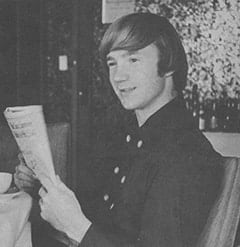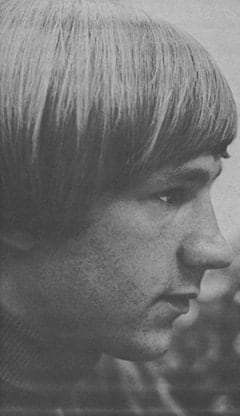
Peter Tork is a very determined young man. He says what he feels, and when he makes up his mind to do something—he does it.
The world may not be ready for this announcement. There is going to be a Monkee in politics.
Partisans of both parties have been saying for years, of course, that this is not unusual in the opposition movement. But they are speaking, however bitterly, only in a figurative sense. We are not.
For, in a recent conversation with our reporter, Peter Tork, the most articulate member of The Monkees, indicated that his future was destined to be the political arena, rather than the entertainment spotlight.
“I need to communicate,” Peter told us candidly, “and while that means entertainment now, it probably means politics later on.
“You see,” Peter said earnestly, leaning forward in his eagerness to make his point, “I have a missionary view about a lot of things going on that I think I might help them fix.”
Then, self-consciously, Peter made a deprecating gesture, as if to excuse his serious outburst. But he was serious; completely so. There was no mistaking that.
Such an attitude should not be surprising, coming from this young man. For his family background is such as to encourage it. Also to encourage Peter’s way with words, by his own admission.
“I’m as articulate as they come, short of being a college professor,” Peter laughed, “and maybe that’s because my father is a college professor. Goes along with my mother’s work, too, for that matter.
“Why I remember my mother getting her Master’s Degree when she was pregnant with my baby sister, who’s nearly twelve years old now,” Peter recalled joyfully. “I saw Mother stand up and get that degree. It was a kick.”
Peter’s father, H.J. Torkelson is, indeed, associate professor of Economics at the University of Connecticut. “But he’s on leave this year,” Peter told us, “teaching in Sascachawan [sic]. And my brother Nick, who is twenty-one, is there, too, teaching English and getting his Master’s.”
But the academic life palled early for Peter. Oh, he tried. He attended Carleton College in Minnesota, with the idea of becoming a teacher himself. But he saw that the academic life really was not for him, so he dropped out of school and headed for New York.
Nevertheless, despite presently being so far removed from the world of thoughtful opinion-making and formal government, Peter has never lost his desire to be a more active participant in “saying something” to the world.

“I think we’re doing some things here on the show,” Peter insists. “I really do.
“I wish there were more time to say more things,” he sighed wistfully, “but even as it is, I think we’re doing things for people. I hope so, anyway.”
Perhaps Peter is correct, though this is hardly the concept the average adult has as he watches what appears to be utter mayhem conducted each week by The Monkees on their highly successful television series.
But perhaps to a teen-ager, for whom the show patently is designed, the series does, indeed, carry a message. One that gets through to the young person, where all the devices heretofore designed to do just that have failed miserably.
Perhaps, as Peter says, The Monkees do, indeed, have a method to their madness. One that is supposed to do—and does—much more than present a half hour of fun and games and enrich the bank accounts of everyone connected with the program.
Nor does Peter think that just because he is in the entertainment world this should keep him out of government.
“Listen, an entertainer is a citizen,” Peter says bitingly. “Just as much a citizen as the banker or businessman. More so most of the time, if anyone judges by the taxes paid by entertainers. So you tell me if a guy cares about what is going on, and he’s been supporting his government for years with a bunch of bucks, why shouldn’t he get in there and try to do what he thinks will make things better?”
Evidently no reason at all, if any conclusion is to be drawn from the recent rash of actors successfully making the transfer to politics in the State of California. It is no coincidence that the first words of the new Governor of California to the junior Senator from California, following the former’s swearing in, were, “Well, George, we’re back on the late show again.”
Because, in a sense, they were. For the Governor, as everyone knows, was erstwhile actor Ronald Reagan, and he was speaking to Sen. George Murphy, whose old motion pictures pop up regularly to entertain those who don’t go to bed early.
So Peter Tork has some highly-placed examples to give him encouragement for his political ambitions. And, by the time Peter makes up his mind to make the move, there well may be more. Rumor is rampant that Robert Vaughn, just as soon as The Man From U.N.C.L.E. goes off the air, will run for public office.
Peter sees nothing but advantage to be had from a previous career as an entertainer. “I think you have more poise as a speaker,” he says.
True, but might not an actor, by dint of his professional ability to perform, be just fooling the public, or misusing his ability to sway people?
“How?” Peter inquired, bristling a bit. “How on earth can anybody really be swayed for very long, no matter how great a performer a man is, if that man doesn’t really have anything to say?
“Look,” Peter went on unhesitatingly, “Let’s say, just for the heck of it, that some joker did just act his way into office, huh? Okay, then what? He’s got to produce after he gets there, hasn’t he? And that, pal, is where he finds his moment of truth.”
“If he does a lousy job,” Peter chuckled, “he won’t get elected the second time. You can bet on that. And if he does a good job, why shouldn’t he be re-elected, just like a lawyer, or anybody else?”
Then, shrugging elaborately, Peter said, “But what the heck. Right now, I just have the show to do every week. Which is great.
“Basically,” Peter went on, “I’m just a happy guy, you see.
“Of course,” he admitted instantly, “right now I’m down, because I’m tired and because I feel bugged about a lot of things.”
The sort of things, obviously, that he feels can best be confronted from the area of politics. Things that need to be made better. Things that grate on Peter’s nerves, and make him want to rush in and try and straighten out.
“But even so,” Peter repeated, as if to emphasize the positive, “I still consider myself a happy guy. Basically, I’m an optimist. I believe things are getting better all the time.
“Maybe not second to second,” Peter said, with a wry grin, “but year by year. There’s a lot to be done, though.”
For a moment, Peter Tork was lost in reverie, as if he already were seeing himself, several years hence, leaving the entertainment world, which has given him so much, to enter the world of politics. A world which might not take him so easily to its heart. But which Peter, imbued with a strong desire for service, is willing to brave.
“You see,” Peter suddenly said, so softly the reporter could hardly hear him, “One of these days, I aim to get my help out there. And I really think I can help.”
He means it.
He intends to try, come what may.
And, who knows, Peter Tork just might be right. It certainly won’t hurt anyone for him to try. It might even help, as Peter predicts.
No one can argue that the world needs all the help it can get.



